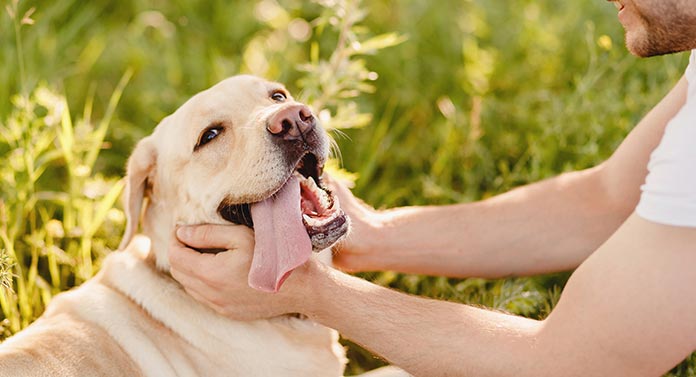
What is a companion dog compared to a service dog or an emotional support dog? The term “companion dog” is another way to describe a pet dog.
A dog is a companion dog if they are kept by their human family simply for the joy that they bring. In other words, they don’t earn their right to be there by carrying out a working or service role.
Some dogs have been exclusively companion dogs for as long as anyone can remember.
Many toy dog breeds, including Pugs and Chihuahuas, started out as companions to members of the ruling classes thousands of years ago.
These days, companion dogs represent almost every single dog breed.
In fact, the AVMA estimates that as of 2018, there are nearly 77 million companion dogs living in the United States. And nearly 4 in 10 homes have at least one pet dog.
Companion Dogs Vs Service Dogs, And Other Important Terminology
Sometimes it feels like there is a lot of jargon about the different roles dogs can have.
Here’s a quick run down of the differences:

Companion Dog
This is simply a pet dog.
Working Dog
A dog trained to carry out a working role.
Such as herding livestock, helping with search and rescues, or finding narcotics for the police.
Service Dog
A dog trained to perform specific tasks for a disabled person.
Also known as an assistance dog, service dogs enjoy special rights to accompany their owner under federal law.
Emotional Support Dog
A dog prescribed by a mental health professional to alleviate the symptoms of a mental health disorder.
Emotional support dogs don’t undergo specific training or complete specific tasks – they “work” simply by their presence.
They have some legal privileges. But not as many as service dogs.
Therapy Dog
A dog who attends schools, hospitals, residential care settings, etc to provide a positive experience for the people there.
Therapy dogs don’t have any special legal status. They might work on a purely informal basis agreed between the setting and their owner. Or undergo some sort of certification through an agency which also arranges work.
Types of Dog
Of course, there are lots of ways these roles can overlap.
Many working dogs live as companion dogs with their handler while they’re off duty.
Emotional support dogs are essentially companion dogs who provide a medically recognized mental health benefit as well.
And most therapy dogs are companion dogs who support other members of the community too. Often alongside their owners.
What Are The Benefits Of A Companion Dog?
Scientific research is bursting with studies and surveys noting the benefits experienced by pet dog owners. Here are just a small handful:
- A 2019 study in Australia found that dog ownership reduces loneliness.
- In 2014, interviews with 29 U.S. military veterans diagnosed with HIV or AIDS revealed that owning a dog provided physical activity, companionship, responsibility, and reduced stress. And in doing so helped to balance the negative effects of their illness.
- Researchers in South Africa have found that elderly people in a residential home experience fewer depression and anxiety symptoms when a companion dog visits them once a week.
- In 2016, a review of 13 separate studies across 5 countries and encompassing over 134,000 people found that dog ownership is consistently associated with increased physical activity.
- And in 2018, Nature magazine reported that growing up with dogs reduces the risk of asthma in children.
Can Anyone Get A Companion Dog?
Yes. Since companion dogs are simply pets, there aren’t any restrictions on who can have one.
But, there are a few things to bear in mind:
- Reputable breeders won’t sell a puppy to someone under 18 years old. Some breeders might even set the limit at 21 years old.
- Some landlords don’t allow companion dogs above a particular size. And some won’t allow any at all in their tenancy agreements.
- Just because you can get a dog doesn’t mean you should get a dog.
- A companion dog will place a huge demand on your time and money. The rewards can be priceless, but keeping one definitely does have an actual price.
So before you take the leap, let’s try and find out if you should get a companion dog.
Should I Get A Companion Dog?
How can you tell if you’ll benefit from a companion dog?
There are some reliable predictors of whether wannabe pet parents will have a happy and satisfying relationship with their dog.
For example, people are more likely to have a more positive view of their relationship with their dog if they don’t have children.
And people are less likely to be satisfied with their dog if the main reason for getting them was for company.
But dog owners who take part in dog sports such as agility or gun dog training are more likely to have a happy and satisfying dog ownership experience.
It’s a Two Way Relationship
This shows that deciding to get a dog shouldn’t just be based on what they can do for us. But what we can do for them as well.
Relationships between humans and dogs don’t always work out. And we see this in the huge surplus dog population living in rescue shelters.
So before you commit to a companion dog, ask yourself what you hope to get out of it. And if you’re going to be able to meet all their needs for the next 10-15 years.
Should I Get A Companion Dog For Help With My Disability?
Dogs help people with all kinds of physical disabilities, learning disabilities, and mental illnesses.
But, trained service dogs are expensive. And waiting lists to get one from a non-profit training organisation are often very long.
So, lots of people want to know if they can enjoy the same benefits with a companion dog, which they train themselves.
Research has shown that for sophisticated support to thrive with a disability, trained assistance dogs are significantly more effective than companion dogs.
If you go down the DIY route, you must have realistic expectations about how much a rearing a puppy will demand from you physically, emotionally, and financially.
And also about your own abilities and limitations when it comes to training them for a specialized role.
What Makes A Good Companion Dog?
There are a wide range of companion dogs to choose from. But research has shown some interesting trends in what we look for in our canine pals.
Interestingly, a survey replicated in Australia and Italy found that physical characteristics had very little importance to people describing their ideal dog.
But, many of the behavioral qualities we look for are universal. Such as:
- safe with children
- housetrained
- healthy
- friendly with humans and other animals
- long lived
- and obedient.
There are some intriguing differences between the sexes though.
On average, women are more likely to prefer a dog who is calm, compliant, sociable, healthy, and non-aggressive. While men are more likely to describe their ideal dog as being energetic, faithful and protective.
And finally there are some fascinating regional variations too. For example, Italian men are significantly more likely than any other demographic to insist that their male dog isn’t neutered!
Which Breeds Make Good Companion Dogs?
Across the world there are now several hundred dog breeds being kept as companion dogs.
And when it comes to making your own choice, it’s all about choosing the breed which is right for your family, lifestyle, and expectations.
Many of the most co-operative and friendly breeds were originally working farm type dog breeds.
Some breeds kept as companion dogs in large numbers are:
Why These Five?
They’re popular because they’re good all-rounders. They tend to be healthy, get on easily with other dogs and people, succeed easily in training, and affectionate with their human families.
In other words, they meet all the universal “ideal dog” criteria we listed above.
And funnily enough, they all started out as working breeds.
Dogs Bred to be Companions
On the other hand, these breeds have been bred exclusively for companionship for much longer:
They all live for human company. But it’s no coincidence that they’ve never had to work. And they all have a higher frequency of health problems related to their body shape.
When dogs don’t need to be physically fit enough to work, breeders may choose to pursue extreme features like tiny size or a flat face. These traits can look cute. But they can be awful for a dog’s health.
Today, those breeding decisions can result in heart ache and hefty vets bills for unprepared pet owners.
Choosing The Right Companion Dog For You
Our hopes and expectations of dog ownership are as unique as everything else about us.
There’s no simple formula for finding the right dog breed for you.
Do lots of research, and try to meet several dogs belonging to the breeds you consider. Don’t forget about mixed breed dogs, and rescue dogs of unknown ancestry.
In fact rescuing an older dog can be a great way of finding a dog which suits you.
The shelter staff will already have a good understanding of what their adult personality is like, and what their care needs are.
So they can match you with a dog perfectly matched to your home.
Are You Ready To Meet Your Ideal Companion Dog?
What breed(s) do you have in mind?
How are you looking forward to them changing your life?
Let us know in the comments box down below!
Readers Also Liked
References
- Christian et al. Dog Ownership and Physical Activity: A Review of the Evidence. Journal of Physical Activity and Health. 2016.
- Diverio et al. The Italian perception of the ideal companion dog. Journal of Veterinary Behavior. 2016.
- Fall et al. Dog characteristics and future risk of asthma in children growing up with dogs. Nature. 2018.
- Gavrok et al. Thriving through relationships: assistance dogs’ and companion dogs’ perceived ability to contribute to thriving in individuals with and without a disability. Disability and Rehabilitation: Assistive Technology. 2020.
- Kass et al. Understanding Animal Companion Surplus in the United States: Relinquishment of Nonadoptables to Animal Shelters for Euthanasia. Journal of Applied Animal Welfare Science. 2001.
- King et al. Describing the ideal Australian companion dog. Applied Animal Behaviour Science. 2009.
- Kruger et al. Perceptions of companion dog benefits on well-being of US military veterans with HIV/AIDS. Southern Medical Journal. 2014.
- Le Roux & Kemp. Effect of a companion dog on depression and anxiety levels of elderly residents in a long‐term care facility. Psychogeriatrics. 2009.
- Meyer & Forkman. Dog and owner characteristics affecting the dog–owner relationship. Journal of Veterinary Behavior. 2014.
- Powell et al. Companion dog acquisition and mental well-being: a community-based three-arm controlled study. BMC Public Health. 2019.

Free Training Tips
Get Pippa's free dog training tips delivered to your inbox

 What Is A Food Puzzle For Dogs?
What Is A Food Puzzle For Dogs?